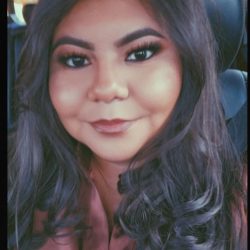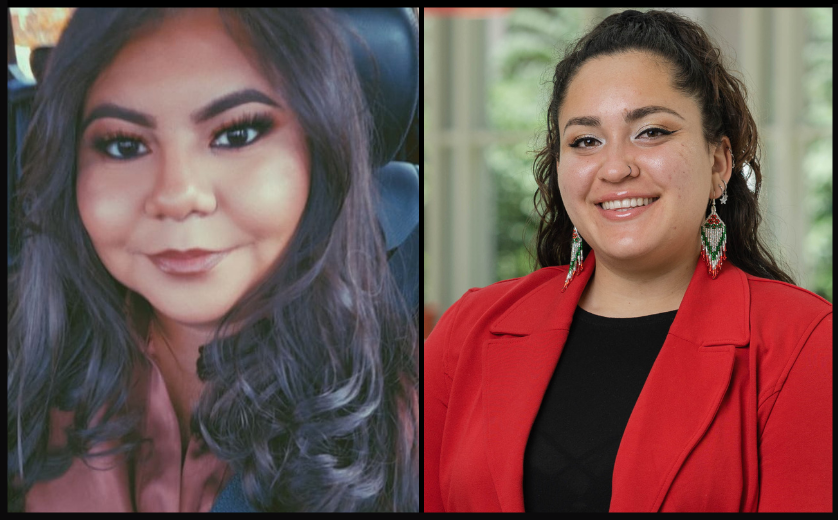Tuesday, November 8, marks National First-Generation College Celebration Day – a recognition of individuals who are the first members of their families to attend college.
The Brown School joins institutions across the country in celebrating its first-generation population!
Among the the full Brown School cohort that began in 2022, 43% are first-generation undergraduate and or/graduate level students. Among MSW students, 45% are first-generation undergraduate and/or graduate-level students; and among MPH students, 41% are first-generation undergraduate and/or graduate-level students.
In recognition of this year’s National First-Generation College Celebration, two Brown School students are sharing their experiences navigating the world of higher education.
Jennell “Jenn” Encizo (She/They) MSW/MBA Student 2024
Tell us a little about you.

I’m a 2nd year MSW/MBA student from Beaumont, CA. I graduated from the University of California, San Diego in 2020 with a B.S. in Cognitive and Behavioral Neuroscience and Business Psychology. I was involved in clinical research, student government, and working with the athletics department throughout my undergrad career, and have followed a similar path here.
I am currently the chair of Mi Gente, the Brown School’s Latino Organization, I work as a Research Assistant at the WashU Medical School for the ABCD Study, and I’m a Graduate Student Assistant for the Liberman Graduate Center in the DUC.
Post-Graduation, I aspire to be a Licensed Clinical Social Worker, and am interested in providing mental health resources and care for historically underrepresented populations to aid in reducing mental health stigma. Other aspirations I have are to work for Sesame Street in their research or social impact department or to work in politics to adjust national mental health policy.
As a first-generation college student, is there anything particularly challenging?
Understanding and using the resources I have available to me was challenging. I didn’t realize that those who are not accustomed to the higher education system are able to ask questions and won’t be perceived as dumb for asking, and we are actually encouraged to ask questions. With that, it took some time for me to grasp the concept that building connections are just as (if not more) important than what you learn in the classroom. Building connections with staff and faculty have helped me feel more comfortable in higher education spaces and have given me opportunities to learn the “tricks of the trade” in how to succeed in higher education. I’ve also realized that staff and faculty are more than willing to help you get connected with someone to aid in progressing your career.
Why did you choose the Brown School?
Funny enough, I chose to come to the Brown School because my Principal Investigator from my undergraduate lab had gotten his Ph.D. in Neuroscience and he advocated for WashU being a good school. I thought “He’s smart, he knows what he’s talking about, I’ll just get my MSW at that school.” I have never heard of WashU or the Brown School and I didn’t realize how prestigious WashU was until after I applied.
Where have you found community and support on campus?
Mi Gente has been a great sense of community for me since Latino population at WashU is very small, which was a big culture shock for me in comparison to California. I have been able to find people who come from similar backgrounds to make me feel a little more at home.
How do you feel the Brown School is preparing you for success?
I feel the Brown School is preparing me for success by giving me great tools, knowledge, and connections (both at WashU and in the St. Louis community) to set me up for success in all aspects of my future career aspirations.
Areli Munoz Reyes, Advanced Standing MSW 2023 (They/She)
Tell us a little about you.

My name is Areli Munoz Reyes. I was born in Tlaxcala, Mexico, and moved to Saint Louis when I was eight. I always wanted to be a nurse, but I found Social Work. I want to be an advocate and promote social justice and elevate the voices of the undocumented immigrant community.
Before graduating high school, I had no confidence whatsoever. I did not know what being undocumented was until I started applying to colleges, but I did not have a social security number back then. My undergraduate experience shaped me to be bold and strong since I had to overcome several barriers. I know now that I am worthy of higher education.
As a first-generation college student, is there anything particularly challenging?
I came to the United States as a child and often struggled to understand my place in the world even in my Latine community. I knew I wanted to use my life to help people by becoming a nurse, but I did not know where to begin. When I discovered Social Work, I knew I had found my path. I finally felt like I was part of something. Something challenging as a first-generation college student is finding a sense of belonging on a college campus because it can make all the difference for first-generation college students.
Why did you choose the Brown School?
As a former DACA recipient student, my journey to become a social worker was not easy. But there are two things I always had determination and a dream, so I took a chance, applied, and was accepted. I am here because I received a generous scholarship that allowed me to attend and reassured me that I belong. A lot of first-generation and undocumented students have insecurities, especially at elite institutions. Having this opportunity makes me feel welcome and that someone believes in me and wants me to succeed. But overall, I know that I am capable and worthy of being here after all my hard work!
Where have you found community and support on campus?
I have found community and support on campus via my professors and classmates. I am proud of my low-income, latine, undocumented identity. My story is who I am and what I will give to the world through my passion for social justice. Our lived experiences made us unique, and the world needs this type of leadership.
How do you feel the Brown School is preparing you for success?
As first-generation students, we know how disparities impact our neighbors and our communities. Therefore, it is rooted in us to find solutions to that reality. Personally, I pushed myself as I have seen firsthand the many traumas experienced by undocumented, underrepresented, low-income, and Latinx populations. My time at the Brown School is preparing me by providing me with firsthand practice and helping me discover ways to combat mental health stigma and systemic racism and to close gaps in healthcare disparities.
The November 8 date for the national celebration was chosen to honor the anniversary of the signing of the Higher Education Act of 1965.
The legislation was passed after President Lyndon B. Johnson called for greater opportunities for members of lower- and middle-income families to get an education beyond high school, and created grants, loans, and other programs to make that possible.
